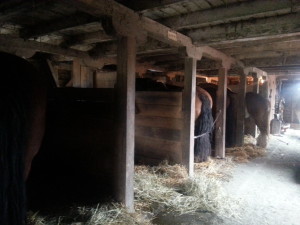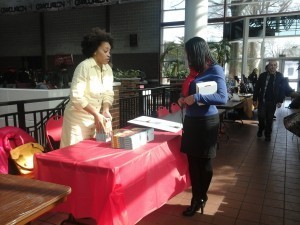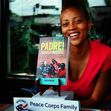Raven Moore's Blog, page 14
August 5, 2014
Are you ready?
Are you ready? Alberto Martos will be known for many great things that are a bi-product of his films. Watch one. Pun intended.
July 6, 2014
Peace Corps Worldwide’s Review of Raven Moore’s Padre!
Review of Raven Moore’s (Cote d’Ivoire 2000-02) Padre!
Permission to repost from Peace Corps Worldwide site under Peace Corps Writers section.
Posted by John Coyne on Sunday, July 6th 2014
Padre!: A Place Whose Rules Rearrange Your Own
By Raven Moore (Cote d’Ivoire 2000-02)
Books by Raven, $19.99 (paper); $9.99 (Kindle)
338 pages
2013
Reviewed by Deidre Swesnik (Mali 1996-98)
“The Ivoirien children who you see me living with on the cover of this book are poor, but poverty is not a permanent condition, nor does it have a recognizable face. Color was and is not often the reason for our mistreatment of one another. The Egyptians, the Moors, the Mongolians, the Romans, the Jews, the British, the Ottomans, the Dutch, the Americans, the Mandinka, the Mayans, and more; the list of conquerors is as diverse as those conquered. Ivoiriens in the Ivory Coast – La Cote d’Ivoire as it is called in West Africa – have it badly, but I’m not here to make you feel sorry for Ivoiriens. Feel sorry for me that it took me so long to figure out why I came here in the first place.”
So begins (well, it’s on page two) Raven Moore’s book about her Peace Corps experience in the Ivory Coast. This paragraph is a great window into what the whole book is about. Some is about race, some is about the conditions in the Ivory Coast, but most is her personal impressions of what is going on and what is happening to her along the way.
Moore does a lot of soul-searching in this book, much of it hilarious. She is “Black” in America but she is usually not seen as “black” in the Ivory Coast. In fact, she is often called “La Blanche,” the white woman, by Ivoiriens. This is a bit of a shock to someone who has come to Africa hoping to find a connection, only to feel like an outsider. (In a funny and ironic twist, even when she meets Ivoiriens who are as light-skinned as she or even lighter, Moore is still referred to as the white woman.)
In some ways, Moore goes through what many of us probably have, thinking we were going to be somewhere familiar or somewhere we viewed as home, only to feel like an outsider. In other ways, her experience is a funny, touching, honest portrayal of race in Africa and in America, and one person’s investigation into what race really means. She investigates race as a construct but also as an identity. She draws connections between Ivoiriens and African Americans, recognizing idioms, expressions, and even sometimes cultural similarities. At other times she sees major differences, and sometimes just settles in and observes.
While we all as Peace Corps Volunteers are part of a cadre of other PCVs, we ultimately have individual experiences and have to figure out a lot of things for ourselves. Moore goes through a few months’ training at the beginning of the book, but soon understands that she has a lot more to learn about the Ivory Coast and her village. Latrines, bucket baths, and no electricity may be the biggest shocks to the system upon arrival, but they soon pale in comparison to understanding a whole new culture and figuring out her role in it.
Moore is supposed to be a health volunteer educating her community about AIDS. How do you talk such an intimate topic when you barely speak the language? Not to mention the fact that you are supposed to talk about sex and how to put on a condom with people you are just meeting? Who could be expected to do that?
Moore does a great job of telling her story in chronological order and not giving away ahead of time some of the crazy things that happen to her, like encounters with snakes and her creepy assigned supervisor. We walk with Moore through her experience, putting together the pieces of the puzzle as they come. We start to see the whole picture slowly but holes remain – like when she doesn’t find out until late in her service that there was actually another volunteer there before she was and the strange things that volunteer supposedly did. She even finds out a major component of how her village politics work on her last day in town.
It seems to me that the two years of Peace Corps are like growing up. You start out stumbling around and talking like a baby. By month six, you are like a snobby adolescent who thinks she knows everything, feels like no one understands her, and is SO ready to go home. By the first year, you are like a twenty-something – slightly cocky but productive and feeling like you have it figured out but really want to make a difference. By the end of two years, you grow up and realize how little you actually knew all along.
Moore takes us through her personal journey and seems to think she has it all figured out by the end of the book. Maybe it’s that she has come to terms with the fact that there are things she doesn’t understand and probably never will. And maybe that’s ok too. She built some wonderful relationships during her service, but unfortunately many of them are drawn into question by the end for one reason or another.
Wondering what the title “Padre” is all about, especially since she is in a French-speaking country? Well, in the book it’s actually “Pahdre” and it’s one of the many names she’s given. You’ll have to read the book – and think really hard – to find out what it means.
Personal aside: This book was especially interesting for me to read because Ms. Moore and I are close in age and served in West Africa around the same time. I am very curious to know how things may or may not be different now. Both Ivory Coast and Mali have gone through significant internal strife since we served, not to mention cell phones.
_____________________
Deidre Swesnik laughed for a lot of her two years in Peace Corps Mali and still does so uproariously with her RPCV friends at home in Washington, DC. DeeDee is the Director of Public Policy and Communications at the National Fair Housing Alliance, loves to edit and read, and is terrified of writing anything longer than two pages.
June 11, 2014
What Country Best Fits My Personality?
New Zealand !! (I gladly take that PlayBuzz)
“You are an adventurous individual who enjoys being outdoors and spending time being active. You are a risk taker and have no problem striking up a conversation with a total stranger. When you travel you love to get to know the locals, and their customs, and are always up for a challenge. You thrive in a culture where others share your deep appreciation for land, and believe life is best lived outdoors. You love a hard hike, but also love the water and are happy to spend a day beach side. You thrive in a society with diversity and appreciate a simpler way of living. You are keen on learning about cultures and customs that are different than your own, and enjoy a deep conversation, whether it be philosophical or spiritual. You are not a city dweller by any means, and definitely believe that life is something to explore and experience firsthand. This country gives you endless opportunities to live both an active lifestyle and enjoy the company of new found friends.”
May 7, 2014
The Chief of Mercer County
The Howell Living History Farm is a 132-acre, mystically green, county park in Lambertville, NJ that makes Anne’s Green Gables look like a patch of grass. It is ran by fellow Jerseyan, runner, and RPCV (Returned Peace Corps Volunteer) Pete Watson. The farms that existed in the Newark Pete grew up in are gone, but on Howell Farm, Pete steadily continues this legacy.
Pete studied English, Education, and French at Lawrence University and worked the summers shoveling horse manure at local farms. Peace Corps perceived this to be everything Pete needed to be an Agricultural Extension Volunteer. So, he left for Dahomey, West Africa in 1971 to train locals in animal traction—using draft animals as farm power.
“I went with thirteen other equally un-qualified people. One was a dairy farmer and he milked cows, but he didn’t know how to train them, yoke them, and hook them to a cart.” They got one month of training in the U.S. Virgin islands and three in Dahomey—now Benin.
EMPATHY
“My Dad was a city kid from New York. He always talked about how many different languages you heard just walking down the street.” Pete’s Dad appreciated diversity and taught his children to be empathetic and sympathetic. “When I went to Dahomey that is exactly what I found—the Chief in my village made sure everyone ate. I felt an instant bond. That’s how I was raised.”
“Once the French left, Dahomeyans filled all former French positions,” Pete recalls. The ones farming had to produce food for themselves and the ones no longer farming. But, with growing populations, these kinds of pressures still exist. More food has to be grown with less land.
“Howell has 115 deer per square mile and there should be no more than 10,” he goes on. Trenton is not an option.
TOGO OR NOT TO GO ?
Post-Peace Corps, Pete met Mary while creating a technical manual for the Peace Corps. She was the manual’s illustrator.
“Togo or not to go—that is the question?” was the tension-breaking question his friend presented to him over beers, struggling between two different kinds of adventures—be the new Peace Corps Training Director in Togo or the Director of an entire park while raising Mary’s 2 and 5 year olds from a previous relationship? Winston, Ryan, Kevin, and Harry are now 38, 35, 25, and 18 respectively. Yes, Pete stayed.
“I’m the farmer. How can I be the Director?” Pete asked in 1985 but the county insisted he give it the old Peace Corps try. Inez Howell gave these 132 acres as a county park in 1974 along with letters describing her childhood here and its value to education. With Pete’s ingenuity, he was able to take the diversity of skills amongst the few Howell staff left and create professional development opportunities through his Intern Program.
Rob Flory never left after his internship—one of many RPCVs looking to upgrade their agricultural skills. People started coming from Ecuador and Kenya to train. They would stay for eight months and Rob, able to speak Spanish and Swahili, set it up through the Multinational Exchange for Sustainable Agriculture.
“These are the kinds of programs that are the first to go,” Pete explains after telling me the internship program is gone. The farm has also educated researchers, teachers, parks and recreation employees, museum students, and organic farmers who know old-school methods are valid.
“But, if this comes through Raven, I’ll be picking that internship program back up soon,” Pete laughs and pulls out a PowerBall ticket.
THE CHIEF OF MERCER COUNTY
Same as that Chief, Pete makes sure everyone is fed. The Greater Mercer County Food Bank in Trenton is blessed with potatoes grown on Howell Farms. Food is also given to the aged, disabled, and volunteers. Too, Howell makes maple syrup for the gift shop. Watch out Vermont.
As I peer out into the April rain, something moves toward me. Maggie now stands below watching elementary school kids jump up into the barn. As the children pass through on their field trip, I cheer “Say hi to Maggie!”
Out of 25 bouncing children only one shouts back, “Hi Maggie!” and walks up. “You’re wet,” he giggles continuing to pat farm dog Maggie’s corncobb-dusted coat before skipping off—the next Pete Watson—concerned about others—a father, a farmer, a Peace Corps Volunteer.
Raven Moore is a Cote d’Ivoire RPCV, Japanese translator, and the recent author of “Padre!”
April 8, 2014
Vermont and Padre – Perfect Together
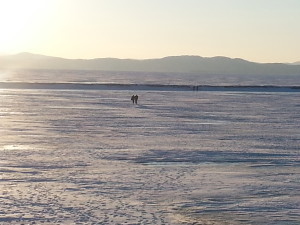
After being warned by my mother that I should not wear my afro out in Vermont because I might get shot by people who think I’m a bear as they’ve most certainly never seen an afro, let alone a Black person before, I get in my car anyway at 5 a.m. and brave the naked roads to get to a book fair in South Burlington, Vermont.
“I have to sell my book. I have to sell my book.” This is the mantra and motivation that propels me through the darkness for five hours as I hurtle through upstate New York toward my destiny.
Sirens happen next of course. Black while driving? No. Driving while black. This combination has never been good for me. The sun and my eyes are a much better combination — which is what I should realize before I get pulled over at 80 miles an hour in a 65 speed zone. I guess. I mean, I don’t think I’m driving that fast. But, who can gauge speed in the dark with nothing along the way except absolute blackness and no cars to compare to?
He’s fine—the state trooper—something I can never not appreciate. A man in a uniform has always been a drool starter for me but then again, I didn’t grow up in the 50s and 60s. I try to flirt with smiles and dumbness as I have successfully done in the past… but he’s not having it. Fifteen minutes later and possibly hundreds of dollars less, I speed off again.
Vermont has a lot of cow signs, a lot of cows, a lot of grain silos, and a lot of piles of hundreds of tires — the explanation for which a ten year old provides later. Oh, and I forget, a whole bunch of White people. Like, a lot of White people. And, of course, my mother being of the Baby Boom generation, a lot of White people means a lot of running in the other direction. But, look, the same thing happened when I went to Cote d’Ivoire. I was warned that I would get my arms and legs chopped off as soon as I got off the plane because Liberia was next door. Fear is always there to thwart you. Courage is much harder to find.
Ian is the ten year old — home schooled, fiercely adoring his Mom in plain view, and more kind and knowledgeable in speech than most adults. Ian not only keeps me great company but introduces me to his entire, book-vending family throughout the day, including his grandmother who he races over in her wheelchair; brings me plenty of chocolate; skillfully discusses what the perfect waffle should look like; explains why Vermont makes the best maple syrup; proves that piles of tires along Vermont farm roads have piles of horse manure underneath them to facilitate turning it into fertilizer; lends the tips that JP Mountain and the Pine Barrons are the places to be, and brings over two crisp ten dollar bills to buy Padre! for his mother before any more of them disappear.
If I’ve learned anything in life, I’ve learned that kids are a reflection of their parents and the society they grow up in. So, I can safely say that Ian represents his parents and Vermont very well and next I meet two best friends who quickly remind me that almost 70% of the entire population of Vermont vote for Obama in 2008 and 2012, that their state is mostly full of people who are hippies to the core, and that here is the number one state in the entire country for Peace Corps Volunteer recruitment.
All of this is naturally proven within the span of two hours as not one but two older, White men quickly come to my table one after the other announcing they served as Peace Corps Volunteers in Ghana and Nigeria respectively. The next White man to the table lived in India for two years on a huge construction project. The next White woman worked for the Foreign Service in West Africa. The next White woman almost sings that a DNA test revealed she is a whole 1% Moroccan. And, the next White woman is married to guess who — an Ivoirien. Let’s not forget the lovely septuagenarian book vendor who comes once to let me know I’m the prettiest thing in the entire fair and then again to check up on me with a courtly glass of water — breaking into a ready, fake, and laughter-binding karate move after I playfully suggest that he moves with the grace of someone who knows martial arts.
In the end, the most important thing is not that I hide my afro, drive 65 in a 65, or even that I sell all of my Padre! copies but that I not miss out on seeing my fellow Peace Corps Volunteer and resident Vermontian whom I had not seen in over ten years; get to enjoy the Skinny Pancake which had everything but pancakes and lots of French speakers as Canada is just next door; and walk on the endlessly beautiful and frozen, 6th largest American lake, Lake Champlain — full of so many Vermontians flocking to the horizon without fear. Thank you.
March 21, 2014
A Chihuahua in Ouagadougou
Sometimes I get out
A writer does not usually
The pot
is brewing
full of images and words
things unsaid and things too said
A hot
steaming pot
of life
bending, bending, wanting, and waiting to pour eagerly
excitedly
onto my head
Let it burn
My yearning
for words. The right words
to describe the wrong feelings,
the wrong people,
the wrong things
To define them
To deny them
To release myself
I’m washed over with words
I hear them screaming, yelling, begging me.
Raven, don’t you see me?
I write it. I write it. I write and write and every word fights with better words.
Some words
get stuck
in unwanted places
They become
the crook in my neck.
The headache under my brow.
The weariness behind my eyes.
That coffee is not working. I’m wanting
a perfection of being. To describe those things. Those things.
What is that you’re seeing? What is that you’re feeling?
Don’t deny it until you know it.
Resist
the temptation to dull yourself,
numb yourself,
reduce,
reuse,
abuse yourself.
What are you seeing? What are you feeling? What are you tasting?
What are you kissing? What are you loving?
It’s a reflection
of you
Organize it
Taste it
Touch it
Feel it
Study it
Sometimes I finish things
I write
a book
I go
outside
I go
online
I sell it
An Israeli idles near me
He picks it up
He recognizes me
in my words
He smiles
He shares
He writes too
Astor Place is full of things
and students
and truants
and artists
like me,
selling
to be sold
on an ecstasy of hope
Changing to be better
An Egyptian picks me up
next
My things
My story
he likes
He smiles
He reads
He offers me his things
I push back with mine
I write.
I write.
I write. I say
Read my words
Read
my words
Read my thoughts
Eat them
Know them
Grow them
into another world
He smiles
He reads
He leaves
and stops
and turns
invites me
Waga awaits you
St Marks Place can give you
a tea or two
There, I stare
I don’t leave
just yet
The Israeli still there watching me
Wondering me
About me
He stares
He reads
He buys
He laughs
That tea is calling him
We exchange a number or two or three or ten. I say when?
He leaves
$20 in my pocket but I go
alone
The Egyptian knows I have words
stuck in unwanted places
A writer’s never done
Expressing all
I absorb
I see
I want
I go there
alone
My leftover, unbought books is a heavy stone on my head.
Left there somewhere
An Israeli, an Egyptian, an Ivoirien now –
He smiles.
He takes.
He reads.
He doesn’t pay me
Just these earrings from his shop I take
I wait
A woman comes
and like a wind
she reads
she buys
she leaves
No more hours of talking
No more Chinese food
No more lovely smells from all the oils, and lotions, and precious cloths and sparkling jewelry and ancient instruments with sounds that float on top of the steaming Ethiopian coffee. The Ivoirien has mesmerized me.
I have to stop it
So,
I wait
I see
I hear the Egyptian speaking to me
He sells me on his ideas
Never materialized
Just there
and good
And then
the German comes
with his very dark
and equally lovely
Dominican wife’s
Chihuahua
and this small presence
fills the entire room
I see
I laugh
I touch
We gather
I leave
Did I use my words wisely?
February 28, 2014
Relief
Relief is when
the walls look white
you forget to fight
the heat embraces
and
your well’s not dry
It’s when you cry so hard
that you
laugh
and then you ask yourself
Self
What
Next?
And this time you don’t say
I don’t know
February 21, 2014
Community Colleges Get a Good Rep
Just yesterday, while participating in the Union County College Black History Month Celebration, I came to the realization that there is no difference between one school and the next. The difference in a school is you. Student after student rushing by on their way to class, I couldn’t tell the difference between their opportunities and those of the ones at an Ivy League school. The ones who stopped, stared, listened, or shared their experiences and insights were just as inquisitive and thoughtful as the ones I studied with at my Georgetown alma mater. To me, having curiosity, a sense of self, and the desire to communicate and connect with others are the greatest signs of intelligence.
“I have a full-time job and a full load of nursing courses but I’ll check your book out as soon as I have the chance. I love to read.”
“I have written for the Star Ledger and I’m working to build more platforms for all kinds of artists.”
“I’m President of the Black Heritage Student Organization… I want to start writing my first book, too.”
I went to UCC with the intention of sharing my accomplishments, my book, and my adventures, but by the end of this event, I felt uplifted by young people who were clearly trying to find their way and make a positive impact on their own lives as well as the lives of others. Everyone has something unique to give to the world and should be given the chance to do so.
February 19, 2014
Right Now
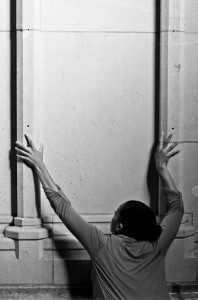
I need to write a poem
about how
my thoughts
are
misperceived by me
I don’t believe
I’m a loser
The steps I take
betray me
Right
and
wrong
Carving
a way
to my destiny
is creating
something
that does not exist
the only way
it will happen
is
if
I believe
that something
that has never happened before
can happen
right
now
February 4, 2014
The American Way

Good speech has not to do with color
but class
Class has not to do with money
but manner
Manner has not to do with intelligence
but training
And training?
Well, honey, if I get me some good training then I don’t need
intelligence, manner, money, or class
This, dear friends, is the American way
today



